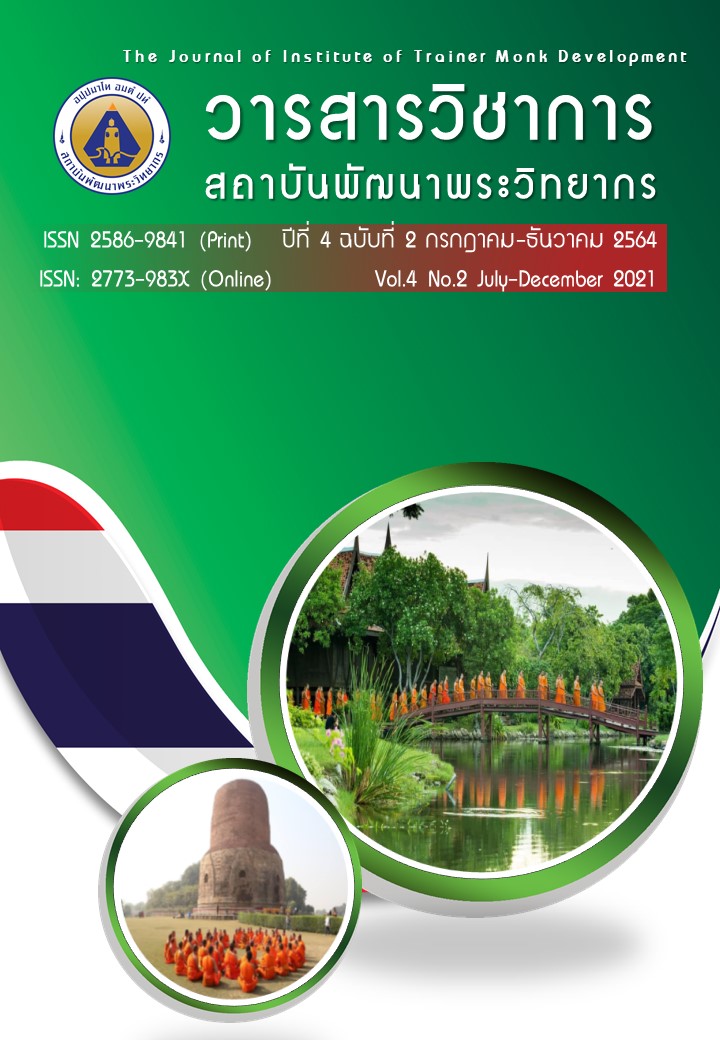Bun Khao Sak and Identity Construction of Theravada Buddhism
Main Article Content
Abstract
This article entitled to study and to analyze Bun Khao Sak and Identity Construction of Theravada Buddhism. This is a qualitative research done by studying academic documents. It was found that Bun Khao Sak is a tradition in the Northeast with offering food or wares to monks by a lottery mode. By the way, it’s about a merit-making dedication to the spirits of the ancestors according to the beliefs of making merit and dedication in Buddhism according to the Buddhist principles of gratitude and mutual assistance. In Bun Khao Sak, it has created a Buddhist identity through symbolic characteristics that to make merit about life after death. This is a ritual that will help build morale in life and not despair over loss. In the identity of the belief, it comes from the merit of Bun Khao Sak associated with those who have the prestige comes from being born first who would be worshiped. When we worshiped them, we can be protected from all bad things. In addition, the identity of the narrative comes from the mention of karma that should encourage good rather than bad. Finally, that story should encourage auspiciousness in life, especially the developed mind.
Article Details
บทความที่ได้รับการตีพิมพ์เป็นลิขสิทธิ์ของวารสารวิชาการสถาบันพัฒนาพระวิทยากร
ข้อความที่ปรากฎอยู่ในบทความที่ได้รับการตีพิมพ์ในวารสาร ถือเป็นความรับผิดชอบของผู้เขียนบทความ และข้อคิดเห็นนั้นไม่ถือว่าเป็นทัศนะและความรับผิดชอบของกองบรรณาธิการวารสารวิชาการสถาบันพัฒนาพระวิทยากร
References
พงศ์ศิริ บุดดีจีน, ชุฏิภัคศ์ เขมวิมุตติวงศ์, หนูม้วน ร่มแก้ว. (2557). การผลิตวีดิทัศน์สารคดีเรื่อง ภูมิปัญญาประเพณีการตานขันข้าวแบบล้านนา: กรณีศึกษาอำเภอสันทราย จังหวัดเชียงใหม่. วารสารมหาวิทยาลัยราชภัฏลำปาง 3(1) เมษายน-กันยายน, 103-118.
พระปรีชา คุตฺตจิตฺโต และสุวิน ทองปั้น. (2560). ประเพณีบุญข้าวสาก จังหวัดข่อนแก่น. วารสารบัณฑิตศึกษามหาจุฬาขอนแก่น (4)1 มกราคม-มิถุนายน, 94-106.
พระครูโกวิทสุตาภรณ์. (2563). บุญข้าวสาก: มิติความเชื่อและพิธีกรรมทางศาสนากับคุณค่าเชิงจริยะในสังคมไทย. วารสาร มจร ปรัชญาปริทรรศน์ 3(2), 42-54.
พระธรรมกิตติวงศ์ (ทองดี สุรเดโช). (2548). คำวัด. กรุงเทพมหานคร: เลี่ยงเซียง. พระพรหมคุณาภรณ์ (ป.อ.ปยุตฺโต). (2558). พจนานุกรมพุทธศาสตร์ ฉบับประมวลธรรม. พิมพ์ครั้งที่ 31. กรุงเทพมหานคร: สำนักพิมพ์ผลิธัมม์.
พระพรหมคุณาภรณ์ (ป.อ.ปยุตฺโต). (2558). พจนานุกรมพุทธศาสตร์ ฉบับประมวลศัพท์. พิมพ์ครั้งที่ 24. กรุงเทพมหานคร : สำนักพิมพ์ผลิธัมม์.
มหาจุฬาลงกรณราชวิทยาลัย. (2539). พระไตรปิฎกภาษาไทย ฉบับมหาจุฬาลงกรณราชวิทยาลัย. กรุงเทพมหานคร : โรงพิมพ์มหาจุฬาลงกรณราชวิทยาลัย.
มหาจุฬาลงกรณราชวิทยาลัย. (2553). อรรถกถาพระไตรปิฎกภาษาไทย ฉบับมหาวิทยาลัยมหาจุฬาลงกรณราชวิทยาลัย. กรุงเทพมหานคร: โรงพิมพ์มหาจุฬาลงกรณราชวิทยาลัย.
อคิน รพีพัฒน์. (2551). วัฒนธรรมคือความหมาย: ทฤษฎีและวิธีการของคลิฟฟอร์ด เกียร์ซ. กรุงเทพมหานคร: ศูนย์มานุษยวิทยาสิรินธร.
Charles F. Keyes. (1997). “Ethnic groups, ethnicity”. in The Dictionary of Anthropology. edited by Thomas Barfield. Oxford: Blackwell Publisher.
Max Weber. (1968). Economy and Society: An Outline of Interpretative Sociology. transl. and ed. by G. Roth and C. Wittich. New York: Bedminster Press.


